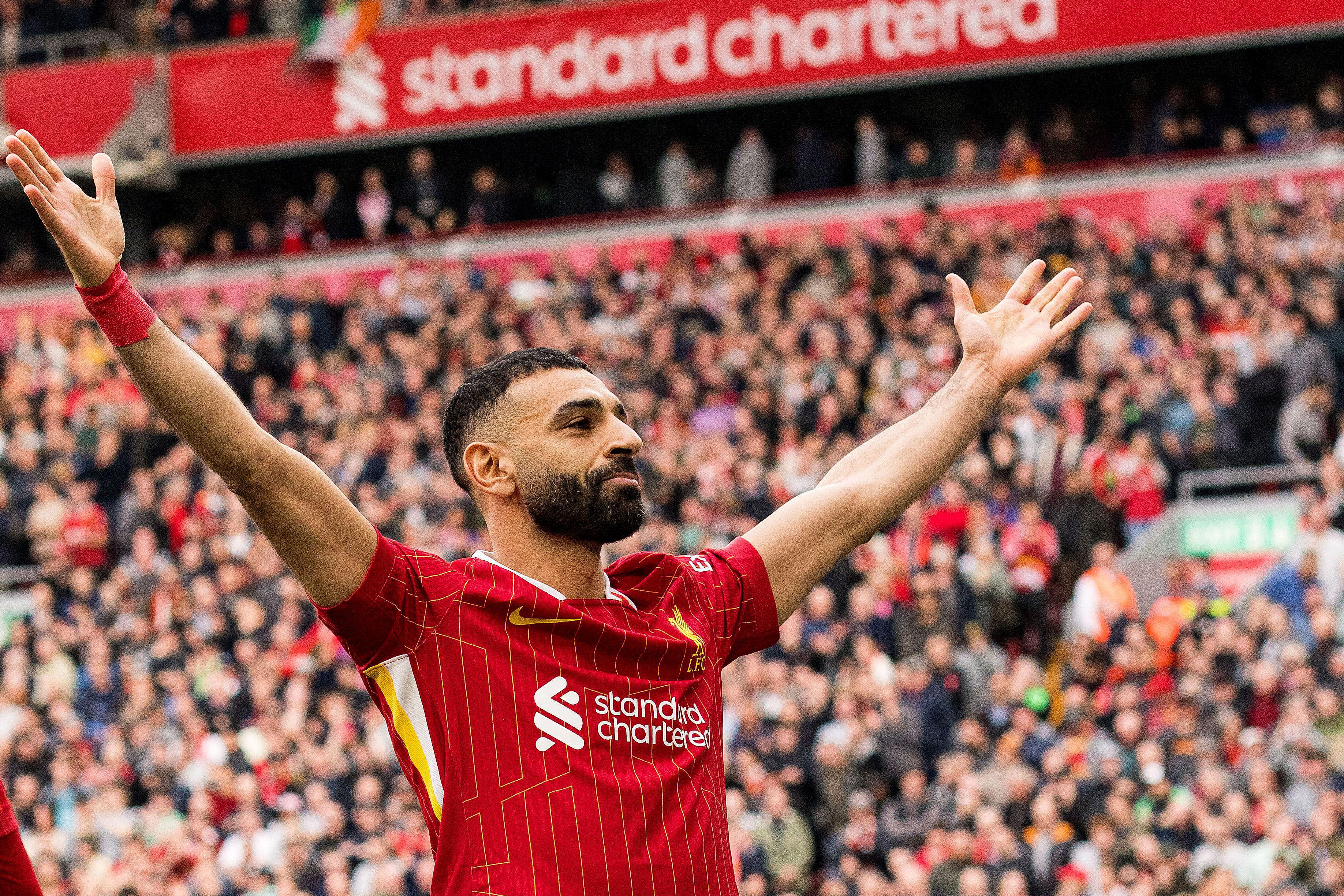FourFourTwo’s 50 Best Football Managers in the World 2016: 40-36
Moving on up with a title winner, Italy's next big boss and a much-beloved ladies' man
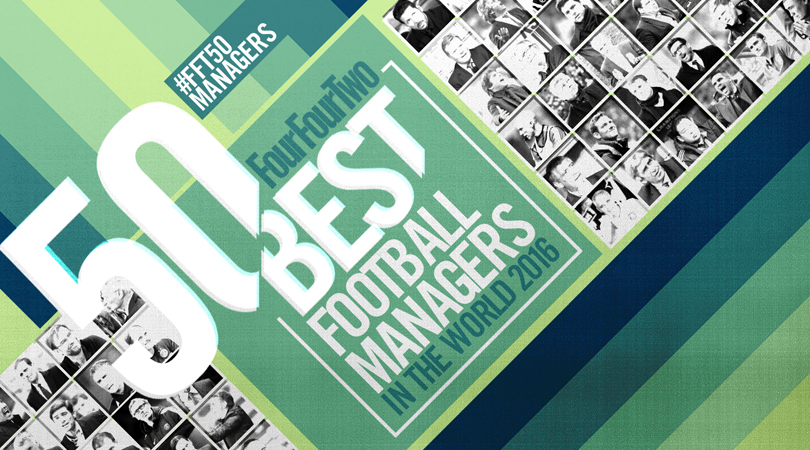
Words: Jeff Kassouf, Tom Kundert, Joe Brewin, Chris Flanagan, Adam Digby
40. Mark Sampson (England Women)
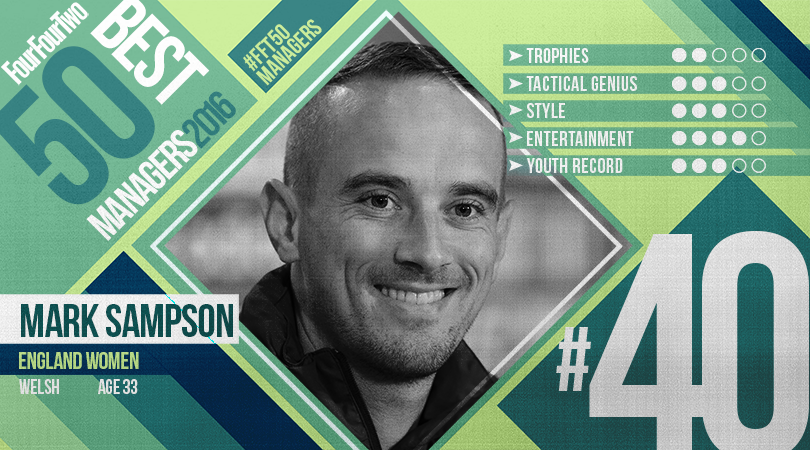
A great manager and coach, able to change our tactics depending on who we've been playing and give that element of surprise to the opposition
Sampson is the definition of a players’ coach. Look no further than the scenes after England’s semi-final loss in the 2015 World Cup. Defender Laura Bassett had just scored one of the most unlucky own goals ever seen, finding the top corner of her own net in stoppage time against Japan to end England’s hopes of a passage to the World Cup final against the mighty United States.
Bassett was inconsolable, crying on the field as Japan celebrated a second straight trip to the final. Dejection in those moments is palpable and often contagious, but the manager's head didn’t drop. He rallied his team both privately and publicly, holding court in one of the most inspiring post-match press conferences for some time. Sampson praised Bassett as a hero, demanding that his people at home welcome back her and the team as such.
England went on to beat Germany in the third-place match, a remarkable recovery and a marker of the team’s progress, having been blown off the pitch nine months earlier by Die Nationalelf in a Wembley friendly. Sampson since has the Three Lionesses unbeaten in Euro qualifying and living up to their world No.4 ranking, as shown earlier this year in gritty matches against France, Germany and the United States. Aged just 33, he has done all this after taking over the job from Hope Powell, whose time was up after 15 years in charge of England.
As the FA have just concluded their search for the next manager to guide its men’s team past another major-tournament disappointment, the suits can take solace knowing that their women’s manager is both tactically sound and motivationally superior. Sampson isn’t just a coach; he’s a manager, and his players’ belief in him shows. JK
39. Rui Vitoria (Benfica)
Get FourFourTwo Newsletter
The best features, fun and footballing quizzes, straight to your inbox every week.
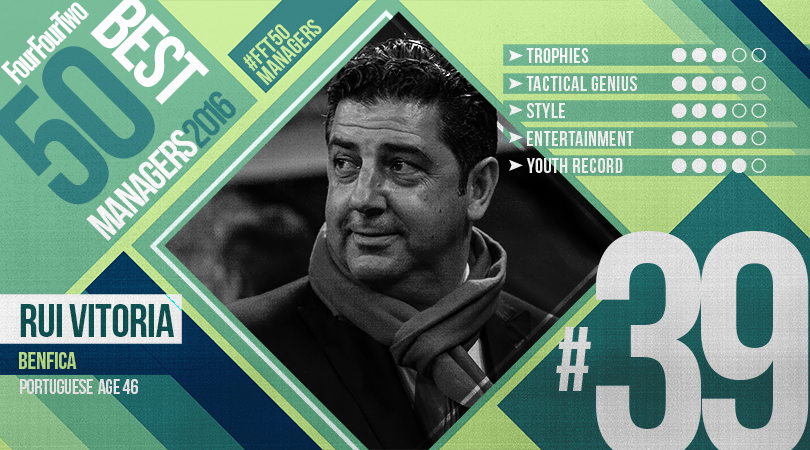
It’s fair to say most Benfica fans were underwhelmed by the choice of Vitoria to take over from Jorge Jesus last summer. The likeable figure had done a solid job at Vitoria Guimaraes, not least in guiding the northern club to its first ever trophy in 2012/2013, lifting the Portuguese Cup after beating Benfica in the final.
Although Guimaraes are a club with passionate and demanding fans, Benfica are an altogether different beast. And after a shaky start that included three defeats to city rivals Sporting, now managed by Jesus, Vitoria was on borrowed time. He never lost his composure, though, not even in the face of constant sniping from Jesus who basically said that Vitoria was in over his head. Repeatedly.
Rui Vitória has the character of the greats, the ambition of winners, the will of those who never surrender and an additional commitment brought by being a Benfiquista
Undaunted, the 46-year-old gradually began to turn it around. A truly outstanding run in the league – Benfica won 25 and lost just one of their last 27 games – ended in triumph for the Eagles. The fact they pipped Jesus’s Sporting by two points made it all the sweeter. Particularly commendable was Vitoria’s fearless use of youth: the contributions made by the likes of midfielder Renato Sanches and goalkeeper Ederson were crucial for the success.
Throw in a laudable Champions League campaign that ended in narrow defeat to Bayern Munich in the quarter-finals, and Vitoria had well and truly dispelled all the initial doubts about his ability to coach at the highest level. Your move, Jesus. TK
38. Dieter Hecking (Wolfsburg)
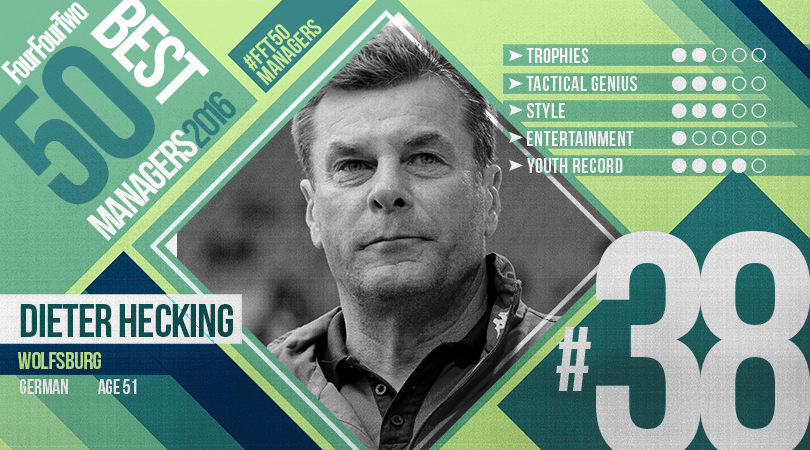
Hecking may not be among the most-loved managers in Germany, but you can’t deny that he’s made them a better team since arriving in January 2013, when the northerners were slumped just above the relegation zone.
In the second half of that season they lost just three of their final 17 games to finish comfortably in mid-table; the following campaign, 2009’s Bundesliga champions were celebrating Europa League qualification. In 2014/15 they went two better, finishing second to seal an automatic return to the Champions League and beating Borussia Dortmund in the DFB-Pokal final.
Wolfsburg have been incredible under Hecking. People want to see competition for Bayern and here it is
Ex-Nuremberg chief Hecking has benefited from significant spending, no doubt – after all, you don’t attract the likes of Luiz Gustavo, Kevin De Bruyne, Max Kruse, Andre Schurrle and Julian Draxler with magic dust and sock-puppets – but nobody should need reminding that money doesn’t guarantee success.
The 51-year-old will want to forget last term’s dismal eighth-place finish, but there's hope in their run to the Champions League quarter-finals after topping a group featuring Manchester United and PSV. Wolfsburg are often forced to sell stars too, though, and this will be a testing season: after Ivan Perisic joined Inter last summer, De Bruyne also slipped away mid-season, and Schurrle has joined Dortmund this summer. With Kruse set to follow suit, Hecking’s challenge is a revamp. JB
37. Eddie Howe (Bournemouth)
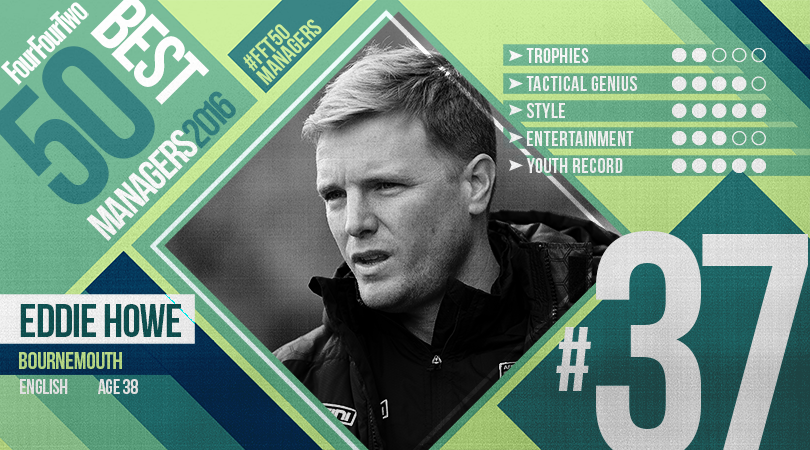
Howe’s career could have been very different, had his first steps into management been judged purely on results. Appointed interim boss of Bournemouth midway through the 2008/09 season, he took charge of two games – and lost them both.
But that doesn’t tell even a fraction of the story. When Howe took over aged 31, Bournemouth were seven points adrift of safety in the League Two relegation zone, having been deducted 17 points after going into administration.
Even in those two defeats as interim manager, his bosses had seen something. Performances had improved, and the job was his. Bournemouth won 12 of the next 21 games, preserving the Football League status they had held since 1923. Promotion followed a year later.
Soon afterwards Howe departed to join Burnley. It always seemed reluctant – amid further interest from Crystal Palace and Charlton, he stood outside Bournemouth’s home ground and announced he was staying, only for Burnley to prove more persuasive five days later.
It's coaches like Eddie Howe who will take the game forward in this country because they believe in a way of working and they have a philosophy
At Turf Moor, he signed Charlie Austin and Danny Ings, although a leaky defence prevented the promotion challenge he’d hoped for, before the death of his mother prompted him to return to Bournemouth to be closer to his family.
Howe simply picked up where he'd left off at the south coast club, as the Cherries’ relentless march continued with promotion from League One, then two years later to the top flight for the first time in their history – earning him the Football League’s manager of the decade award.
If many thought them likely to last only a season in the Premier League, Howe helped Bournemouth avoid relegation in surprisingly comfortable fashion, with a continued commitment to attractive, passing football.
Now 38, he exudes a quiet authority – measured, polite, fiercely hard-working. Injuries ruined a once promising playing career. He’s more than making up for it in management. CF
36. Eusebio Di Francesco (Sassuolo)
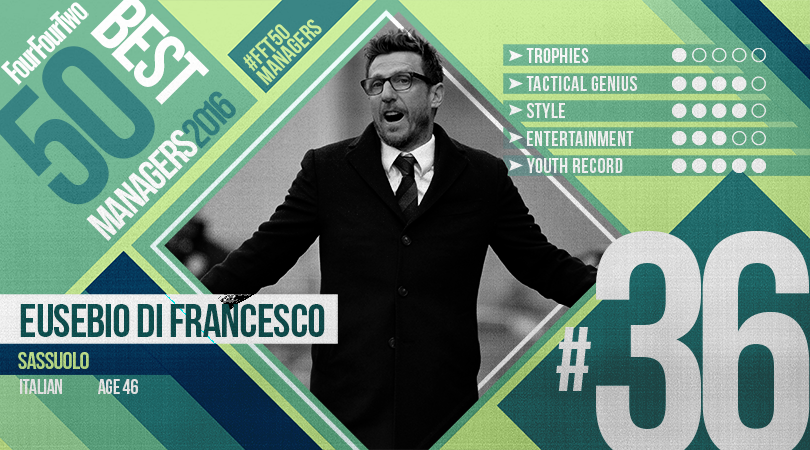
Recent seasons have seen tiny Sassuolo emerge as an example to follow for all Serie A clubs. While many of their rivals refuse to move with the times, the Neroverdi have invested heavily in young Italian talent and own their own stadium – and their efforts were rewarded with wins over the likes of Milan and Juventus.
Yet even as the likes of Domenico Berardi and Sime Vrsaljko (now of Atletico Madrid) attracted attention, the club's shrewdest investment was undeniably coach Eusebio Di Francesco.
Di Francesco is better than Conte because he knows how to nurture young players. With Conte, despite him being a great coach, I was struck by the fact that he didn't pay any attention to Sassuolo despite the season we had
Just three years after guiding them to the top flight for the first time in their history, the former Roma midfielder has steered Sassuolo into Europe. He employs a high-octane and exciting brand of football that has won him many admirers, but the man himself prefers to highlight other areas.
“Along with an impressive attacking approach, we also have the fourth-best defence in the league," Di Francesco said last season. "That means the team works as a unit, not just as a back four."
His efforts have been recognised by the traditional big clubs, with Milan already having tried to tempt him to join them. Asked about speculation that he could move to San Siro, he simply replied: "I can't work amid such confusion". Smart man. AD
50-46 • 45-41 • 40-36 • 35-31 • 30-26 • 25-21
FourFourTwo's 50 Best Football Managers in the World 2016
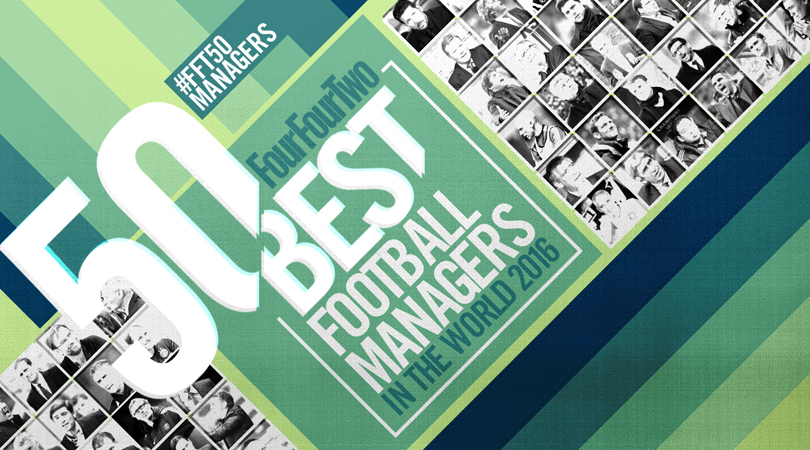
Gary Parkinson is a freelance writer, editor, trainer, muso, singer, actor and coach. He spent 14 years at FourFourTwo as the Global Digital Editor and continues to regularly contribute to the magazine and website, including major features on Euro 96, Subbuteo, Robert Maxwell and the inside story of Liverpool's 1990 title win. He is also a Bolton Wanderers fan.
